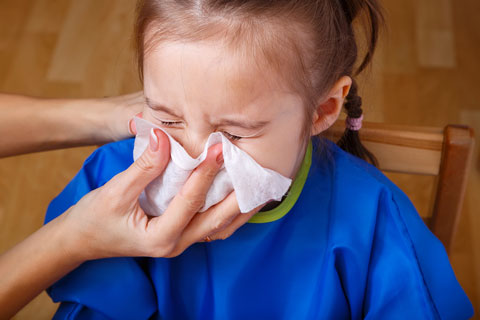A child is too sick to be in child care if he feels too ill to take part in the planned activities OR if she needs more care than you can give without spreading the illness to others. Illinois State Licensing Standards for Day Care Centers say child care centers must screen children for illness every day when they arrive. Children with certain signs of illness must be excluded. Here are the minimum state requirements. Your center’s standards may be more stringent.
What are some signs that I should send the child home?
- Fever: has a temperature of 101 degrees F (oral) or higher and change in behavior
- Skin: has rash and temperature of 101 degrees F (oral) or higher, OR rash with behavior change, OR impetigo (itchy, oozing sores)
- Eyes: has purulent conjunctivitis (pinkeye—the white of the eye is pink or red, with white or yellow discharge or crust)
- Behavior: is very tired or irritable; cries a lot more than usual (especially infants)
- Respiratory: has trouble breathing
- Digestive: has diarrhea; has vomited two or more times in the past 24 hours (unless you are sure the vomiting is related to a non-contagious condition and the child is not likely to become dehydrated)
- Mouth: has mouth sores, with drooling
- Symptoms of a serious communicable disease identified in the Illinois Department of Public Health (IDPH) Control of Communicable Diseases code
When can the child return?
- Chickenpox: at least 6 days after the rash began
- Impetigo: after 24 hours of treatment, if affected area is covered
- Head lice or scabies: the morning after the first treatment
- Conjunctivitis (pinkeye): after 24 hours of treatment
- Mumps: 9 days after the glands below the ears began to swell
- Strep throat: after 24 hours of treatment AND 24 hours without fever
- Mouth sores: when health care provider says child may return
- Whooping cough: after completing 5 days of antibiotic treatment
- Measles: 4 days after the rash is completely gone
- Other serious, communicable diseases noted in the IDPH Code: after the health care professional says the child can return to child care
What else do many health care professionals recommend?
- Caregivers should contact parents and separate a child who has green or yellow mucus in the nose or eyes; OR coughs up green or yellow mucus; OR has discomfort (toothache, sore throat, earache, or nausea), even without fever.
- Caregivers may contact their area’s child care nurse consultant for more information.


 PDF
PDF